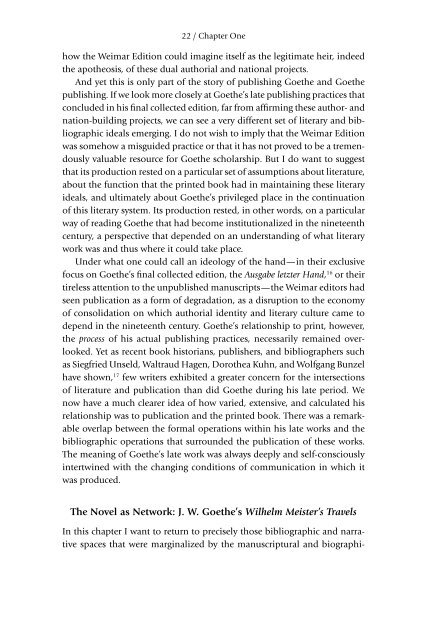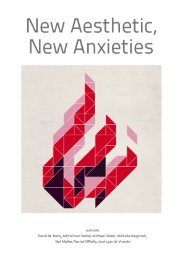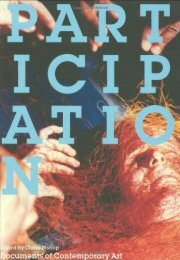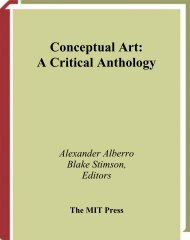- Page 2: Dreaming in Books
- Page 5 and 6: PUBLICATION OF THIS BOOK HAS BEEN A
- Page 8 and 9: List of Illustrations / xi Acknowle
- Page 10: FIVE / Overhearing / 153 The Proble
- Page 13 and 14: 6.9 Goethe’s sketch, “Spirale I
- Page 15 and 16: xiv / Acknowledgments who have been
- Page 18 and 19: Hypothesis: All is Leaf. —J. W. G
- Page 20 and 21: Bibliographic Subjects / 3 ity. . .
- Page 22 and 23: Bibliographic Subjects / 5 dollars
- Page 24 and 25: Bibliographic Subjects / 7 If roman
- Page 26 and 27: Bibliographic Subjects / 9 generati
- Page 28 and 29: Bibliographic Subjects / 11 works o
- Page 30 and 31: Bibliographic Subjects / 13 (and in
- Page 32 and 33: Bibliographic Subjects / 15 quieu
- Page 34: Bibliographic Subjects / 17 book as
- Page 37: 20 / Chapter One circles, and the d
- Page 41 and 42: 24 / Chapter One through space in t
- Page 43 and 44: 26 / Chapter One the Travels in boo
- Page 45 and 46: 28 / Chapter One however, chapter 1
- Page 47 and 48: 30 / Chapter One format of the misc
- Page 49 and 50: 32 / Chapter One by the 1820s than
- Page 51 and 52: 34 / Chapter One novation that surr
- Page 53 and 54: 36 / Chapter One Figure 1.1 Network
- Page 55 and 56: 38 / Chapter One acters from their
- Page 57 and 58: 40 / Chapter One In order to show y
- Page 59 and 60: 42 / Chapter One Figure 1.2 The ima
- Page 61 and 62: 44 / Chapter One construction of a
- Page 63 and 64: 46 / Chapter One tor). Commentators
- Page 65 and 66: 48 / Chapter One point to the femal
- Page 67 and 68: 50 / Chapter One Wilhelm to move fr
- Page 69 and 70: 52 / Chapter One of publishing and
- Page 71 and 72: 54 / Chapter Two deeply touched by
- Page 73 and 74: 56 / Chapter Two most prominent boo
- Page 75 and 76: 58 / Chapter Two Producing Corporea
- Page 77 and 78: 60 / Chapter Two in the opening vol
- Page 79 and 80: Figure 2.1 Title pages from four se
- Page 81 and 82: 64 / Chapter Two to see a work’s
- Page 83 and 84: 66 / Chapter Two Caracci who cleane
- Page 85 and 86: 68 / Chapter Two work—revealed no
- Page 87 and 88: 70 / Chapter Two I want to suggest
- Page 89 and 90:
72 / Chapter Two Franz Bickert, a g
- Page 91 and 92:
74 / Chapter Two tions of the veter
- Page 93 and 94:
76 / Chapter Two tion to such commu
- Page 95 and 96:
78 / Chapter Two the moment of the
- Page 97 and 98:
80 / Chapter Two interrupting someo
- Page 99 and 100:
82 / Chapter Two um die holde Gatti
- Page 102 and 103:
Until—What’s this the Germans s
- Page 104 and 105:
Processing / 87 or publishers, edit
- Page 106 and 107:
Processing / 89 the differentiation
- Page 108 and 109:
Processing / 91 book, I truly sense
- Page 110 and 111:
Processing / 93 document constitute
- Page 112 and 113:
Processing / 95 review of Hagen’s
- Page 114 and 115:
Processing / 97 of their practices
- Page 116 and 117:
Processing / 99 greater romantic fa
- Page 118 and 119:
Processing / 101 nationalist editor
- Page 120 and 121:
Processing / 103 effacement of edit
- Page 122 and 123:
Processing / 105 as well as endnote
- Page 124 and 125:
Processing / 107 “Now haud thy to
- Page 126 and 127:
Processing / 109 presence. That log
- Page 128 and 129:
Processing / 111 hand an assurance
- Page 130 and 131:
Processing / 113 rarely follow the
- Page 132 and 133:
Processing / 115 guilt and her foll
- Page 134 and 135:
Processing / 117 sleeping with the
- Page 136 and 137:
Processing / 119 principles behind
- Page 138 and 139:
“What hands are here?” —Shake
- Page 140 and 141:
Sharing / 123 miscellanies were dra
- Page 142 and 143:
Sharing / 125 book within household
- Page 144 and 145:
Sharing / 127 critical and collecte
- Page 146 and 147:
Sharing / 129 point of taste with t
- Page 148 and 149:
Figure 4.3 Dedicatory poem, Taschen
- Page 150 and 151:
Sharing / 133 from nineteenth- cent
- Page 152 and 153:
Sharing / 135 Figure 4.4 Financial
- Page 154 and 155:
Sharing / 137 Figure 4.6 Wallet bin
- Page 156 and 157:
Sharing / 139 which was published i
- Page 158 and 159:
Sharing / 141 Don Antonio and Don A
- Page 160 and 161:
Sharing / 143 of Irving’s miscell
- Page 162 and 163:
Sharing / 145 someone who projects
- Page 164 and 165:
Sharing / 147 in the network is cal
- Page 166 and 167:
Sharing / 149 printed in the Knicke
- Page 168 and 169:
Sharing / 151 to do with one anothe
- Page 170 and 171:
“I still don’t understand! If y
- Page 172 and 173:
Overhearing / 155 in a number of ne
- Page 174 and 175:
Overhearing / 157 recover, not lose
- Page 176 and 177:
Overhearing / 159 has emerged as on
- Page 178 and 179:
Overhearing / 161 Bachleitner has s
- Page 180 and 181:
Overhearing / 163 Women, Translatio
- Page 182 and 183:
Overhearing / 165 and offspring in
- Page 184 and 185:
Overhearing / 167 as Hemans called
- Page 186 and 187:
Overhearing / 169 baroque; works th
- Page 188 and 189:
Overhearing / 171 husband and wife.
- Page 190 and 191:
Overhearing / 173 ette writes, “I
- Page 192 and 193:
Overhearing / 175 poet—almost per
- Page 194 and 195:
Overhearing / 177 and disclosure, a
- Page 196 and 197:
Overhearing / 179 heroïdes to whic
- Page 198:
Overhearing / 181 The disadvantage
- Page 201 and 202:
Figure 6.1 The visual epigraph from
- Page 203 and 204:
186 / Chapter Six Revolution, alrea
- Page 205 and 206:
188 / Chapter Six about the interpr
- Page 207 and 208:
190 / Chapter Six with his hero sit
- Page 209 and 210:
192 / Chapter Six Figure 6.3 Plate
- Page 211 and 212:
194 / Chapter Six review of Leonard
- Page 213 and 214:
Figure 6.4 Lithograph of The Annunc
- Page 215 and 216:
198 / Chapter Six a painted Annunci
- Page 217 and 218:
Figure 6.6 Eugen Neureuther, “Der
- Page 219 and 220:
202 / Chapter Six sumed in a fl uid
- Page 221 and 222:
204 / Chapter Six Figure 6.8 Goethe
- Page 223 and 224:
206 / Chapter Six Figure 6.10 Table
- Page 225:
Figure 6.11 Alexander von Humboldt,
- Page 228 and 229:
Adapting / 211 I want to turn now f
- Page 230 and 231:
Adapting / 213 Figure 6.12 Frontisp
- Page 232 and 233:
Adapting / 215 Figure 6.13 Frontisp
- Page 234 and 235:
Adapting / 217 ing the texts themse
- Page 236 and 237:
Adapting / 219 Frenhofer in words t
- Page 238 and 239:
Adapting / 221 of writerly success
- Page 240 and 241:
Adapting / 223 He drew with vigorou
- Page 242 and 243:
Adapting / 225 Figure 6.14 Initials
- Page 244 and 245:
Adapting / 227 Figure 6.16 The hori
- Page 246 and 247:
Adapting / 229 Figure 6.17 The para
- Page 248 and 249:
Adapting / 231 Figure 6.18 The crys
- Page 250:
Adapting / 233 Figure 6.19 The trai
- Page 253 and 254:
236 / In Place of an Afterword Gute
- Page 255 and 256:
238 / In Place of an Afterword by G
- Page 257 and 258:
240 / In Place of an Afterword as J
- Page 259 and 260:
242 / In Place of an Afterword grou
- Page 261 and 262:
244 / In Place of an Afterword The
- Page 264 and 265:
NOTES A note on translations: All t
- Page 266 and 267:
Notes to Pages 4-6 / 249 Gilles Gal
- Page 268 and 269:
Notes to Pages 9-11 / 251 sciousnes
- Page 270 and 271:
Notes to Pages 15-20 / 253 72. Mada
- Page 272 and 273:
Notes to Pages 23-24 / 255 lin: Aka
- Page 274 and 275:
Notes to Pages 26-31 / 257 Azzouni,
- Page 276 and 277:
Notes to Pages 39-44 / 259 “Word,
- Page 278 and 279:
Notes to Pages 50-55 / 261 82. The
- Page 280 and 281:
Notes to Pages 58-65 / 263 20. Sieg
- Page 282 and 283:
Notes to Pages 74-79 / 265 in Sämt
- Page 284 and 285:
Notes to Pages 87-90 / 267 that has
- Page 286 and 287:
Notes to Pages 93-98 / 269 38. Fran
- Page 288 and 289:
Notes to Pages 101-110 / 271 Novel
- Page 290 and 291:
Notes to Pages 122-125 / 273 3. Bar
- Page 292 and 293:
Notes to Pages 127-133 / 275 7 (199
- Page 294 and 295:
Notes to Pages 142-151 / 277 positi
- Page 296 and 297:
Notes to Pages 157-159 / 279 87-96;
- Page 298 and 299:
Notes to Pages 161-165 / 281 38. Ba
- Page 300 and 301:
Notes to Pages 172-177 / 283 in Vir
- Page 302 and 303:
Notes to Pages 185-188 / 285 vols.
- Page 304 and 305:
Notes to Pages 193-203 / 287 Iconog
- Page 306 and 307:
Notes to Pages 212-222 / 289 Revue
- Page 308 and 309:
Notes to Pages 232-240 / 291 branch
- Page 310 and 311:
Aarseth, Espen, 239, 250n31, 291n12
- Page 312 and 313:
convergence, 239-40, 291n13 Cooper,
- Page 314 and 315:
Heroïdes, The, 168, 177, 179 Hesse
- Page 316 and 317:
fection, 123-24; pocket books, 26-3
- Page 318 and 319:
57; Murray, John, 57; Parsons and G
- Page 320:
Volkslied, das, 89, 97, 100-101, 10








